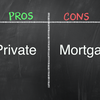B Lender Mortgage in Canada: Pros and Cons

Introduction to B Lender Mortgages
Buying a home is a big step for everyone. That’s why securing the right mortgage is a decision that should not be taken lightly. Even if you’ve identified the home of your dreams, it is important to consider all potential pros and cons before proceeding with the purchase.
In Canada, the first step in securing a mortgage starts with choosing your lender. Although many are familiar with “A lenders” (federally regulated lenders such as the big banks: BMO, CIBC, Scotiabank, RBC, and TD), there is another group of lenders that may suit your needs better: “B lenders” (private, alternative lenders).
According to the Federal Government’s Residential Mortgage Industry Report , “[B lenders] continue to dominate the insured mortgage space after large lenders [A lenders], holding 20% of the market”. There is a very apparent reason for why this is the case.
The criteria for securing a mortgage from A lenders can be very difficult to fulfill, typically involving higher credit score and income requirements, in line with stricter stress test guidelines. B lenders, on the other hand, offer greater flexibility by offering loans to candidates who may not typically qualify for A-lender mortgages. Whether an A or B lender is best for you will largely depend on your specific financial situation.
Pros of Choosing a B Lender
Let’s discuss some expected benefits of choosing a B lender:
- Accessibility and flexibility: Unlike A lenders, B lenders are not federally regulated. As a result, they are able to show more leniency and flexibility in their qualification criteria for a loan. Applicants with low credit scores, nontraditional income sources, or unique financial situations, that may not have qualified for an A lender’s loan, may be approved by a B lender for the very same loan. In Canada, minimum credit score requirements typically fall between 620-680, however an alternative lender may approve your loan even if you fall below this threshold. This flexibility can mean the difference between securing the financing you need for your home.
- Faster approval processes: Less federal regulation also means that B lenders have quicker approval processes. Because they are not legally required to abide by the same complicated regulations guidelines that constrain A lenders, B lenders can often provide borrowers with faster access to funds.
- Personalized service: Unlike traditional banks, B lenders rely less on a pre-dictated set of requirements, and instead take the time to evaluate your application on an individual level, understand your financial situation, and provide an appropriate loan for your needs.
Potential Drawbacks and Risks
B lenders can drastically lower the barriers to entry surrounding homeownership, especially for borrowers with a less established credit history, or non-traditional income sources, the increased risk taken on by the lenders come at a price. To understand this better, let’s take a look at some key drawbacks and risks associated with B lender mortgage loans:
- Higher interest rates and required down payment: Current B lender mortgage rates are typically offered at 1%- 2% higher than those of A lenders. Additionally, the required down payment is significantly higher for B lenders than that required by traditional banks. B lenders typically demand a minimum down payment of 20%, whereas A lenders require a minimum down payment of 5% for their mortgages.
- Potential for additional fees: B lender mortgages are also associated with extra fees, including a standard 1% lender fee, higher fees for processing loans, and more. When considering a B lender, these additional costs should be factored into your overall budget.
- Risk of limited product offerings: A lender, including large banks, may benefit from offering a wider variety of mortgage options. Although B lenders work to provide you with personalized options tailored to your unique situation, they may not have the same variety of mortgages that larger banks offer.
People also search
When to Consider a B Lender
There are specific situations where considering a B lender makes sense. If you lack a well-established credit rating and traditional income source, leveraging B lender mortgages may be the most feasible and practical alternative. If you require a mortgage quickly, the faster approval processes offered by B lenders allow you to quickly secure financing for your home.
While B lender mortgages have pros and cons, they offer a flexible and accommodating alternative for many borrowers who do not qualify for financing through traditional banks. For personalized advice and to explore the best B lender mortgages in Canada, contact Clover Mortgage today. Our experts are here to guide you in selecting the best mortgage options for your next home.
FAQ
What is the difference between A and B lenders in Canada?
As previously discussed, lenders include traditional banks who are typically associated with more stringent requirements to secure a mortgage while providing the benefit of lower interest rates, required down payment, and additional fees. On the other hand, B lenders may include financial institutions such as trust companies and credit unions, who offer mortgages with less stringent requirements but higher interest rates, required down payment, and additional fees.
Do B lenders charge a fee?
Yes, B lenders typically charge additional fees that A lenders do not. These include higher interest rates and a higher required down payment, as well as application fees, appraisal fees, and other processing charges.
Which bank is best for mortgages in Canada?
Selecting the best bank for mortgages widely depends on your specific situation. According to Forbes , “RBC Royal Bank, Scotiabank, TD Bank, CIBC, BMO and National Bank hold 73% of all outstanding mortgages''. These banks are very popular choices due to their wide range of mortgage offerings. However, exploring top B lenders in Canada would be very beneficial for individuals who do not satisfy the requirements for securing a mortgage with traditional banks.





